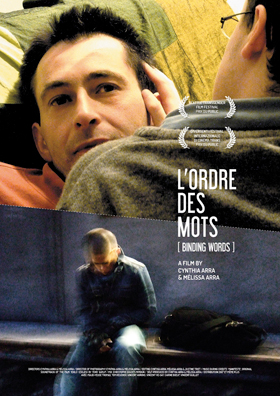Passage extrait du livre “French queer cinema” de Nick Rees-Roberts
The political agenda of the radical movements such as the GAT attempts to free transgender from the domain prism of psychiatry. The community-produced documentary L’Ordre des mots (Cynthia and Mélissa Arra, 2007) likewise attacks the institutional straitjacket of psychiatry through lenghtly, in-depth interviews with some of the main French transgender activists. The documentary’s structure uses testimony to political effect rather than indulging in the cheap voyeurism of a freak show, by giving the articulate subjets the time and space to recount their personal stories. Free from the generic constraints of liberal pity, and without the anthropological tendency to interpret for a mainstream audience, the directors are able to synthetise the differing conceptions of non-normative genders without reducing the testimonies to pre-established binaries. Activist Vincent He-Say gives a politicised account of resistance to a fixed identity as a trans-man. Tom Reucher articulates childhood difficulties and the educational handicap resulting from social exclusion as an FTM transman, personal hardship that is shown without pathos or sentimentality, without the generic device of audience manipulation employed by TV documentaries of the sort made by Mireille Dumas, who has for long exploited gender from behind the mask of liberal sympathy. Her ‘Traverstir’ for Arte’s La vie en face series in 1996 adopted a maudlin approach to transgender. L’Ordre des mots, in contrast, is a breakthrough in the French context simply because it allows its subjects to direct the form of the documentary rather than being subjected to strategic editing techniques that frame transgender people as exotic objects of fascination. L’Ordre des mots does not shy away from painful subjects such as suicide and psychological damage, but instead of localising them as individual deficiencies, it points the finger at the institutional psychiatric damage done to citizens whose lives are manipulated by self-appointed experts. It is the documentary’s matter-of-factness — combining voice-over narrative testimony with prolonged close-up shots of the speaker in the process of thinking — that gives a synchronic picture of trangender life in a national context of harsch psychiatric repression.
